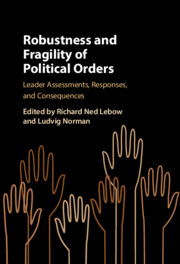Book contents
- Robustness and Fragility of Political Orders
- Robustness and Fragility of Political Orders
- Copyright page
- Contents
- Figures
- Contributors
- 1 Introduction
- 2 Robustness and Fragility of Political Orders
- 3 End of Democracy or Recurrent Conflict: Minimalist Democracy, Legitimacy Crisis, and Political Equality
- 4 Politics and the Administrative State
- 5 Roots in Common: The Fragility–Robustness of Democratic and Ecological Regimes
- 6 The End of Communist Rule in Europe: A Comparative Perspective on the Fragility and Robustness of Regimes
- 7 Democracy’s Fragility and the European Political Order
- 8 The American Fragility–Robustness Nexus
- 9 The Perils of Choice: Structure and Agency in EU Crisis Management
- 10 Conclusions
- Index
4 - Politics and the Administrative State
Perceptions of Stability and Fragility in Weimar Germany
Published online by Cambridge University Press: 25 November 2022
- Robustness and Fragility of Political Orders
- Robustness and Fragility of Political Orders
- Copyright page
- Contents
- Figures
- Contributors
- 1 Introduction
- 2 Robustness and Fragility of Political Orders
- 3 End of Democracy or Recurrent Conflict: Minimalist Democracy, Legitimacy Crisis, and Political Equality
- 4 Politics and the Administrative State
- 5 Roots in Common: The Fragility–Robustness of Democratic and Ecological Regimes
- 6 The End of Communist Rule in Europe: A Comparative Perspective on the Fragility and Robustness of Regimes
- 7 Democracy’s Fragility and the European Political Order
- 8 The American Fragility–Robustness Nexus
- 9 The Perils of Choice: Structure and Agency in EU Crisis Management
- 10 Conclusions
- Index
Summary
The collapse of the Weimar Republic and the ensuing rise of the Nazi dictatorship in Germany serve to this day as a “warning from history.” The precise lessons to be drawn from this episode remain controversial. Did the first German republic collapse from a lack of popular support or from institutional weakness? These questions were far from the minds of Republican elites. Arnold Brecht and Hans Staudinger regarded problems of stability as primarily administrative. Territorial reform and the creation of public–private partnerships were their creative attempts creating some much-needed breathing space for the young Republic. These initiatives tell us much about the reasons why elites overestimated the robustness of their own institutions. At the same time this ill-founded confidence was necessary for such administrative experiments. Paradoxically, assuming stability can be important in encouraging elites in new democracies to engage in necessary reforms. The administrative rationale also had a dark side, however. It led to a myopic focus on technical detail while ignoring the larger political context and in particular, underestimating the systemic threat from political extremism.
- Type
- Chapter
- Information
- Robustness and Fragility of Political OrdersLeader Assessments, Responses, and Consequences, pp. 92 - 114Publisher: Cambridge University PressPrint publication year: 2022



